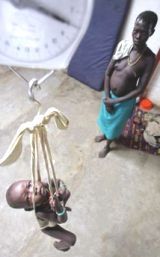Sudan women feed babies leaves to avoid starvation
By Matthew Green
PALIANG, Sudan, May 26 (Reuters) – Mothers in southern Sudan are feeding their children leaves to stop them starving to death after rich countries failed to heed months of appeals to prevent the region’s worst food crisis in seven years.

|
|
A Sudanese woman looks on as her severely malnourished child is weighed at a hospital run by medical charity Medecins Sans Frontieres in the town of Marial Lou, northwest of the southern town of Rumbek, May 26, 2005. (Reuters). |
Young women on Thursday crushed foliage torn from trees then boiled it over fires outside their huts, draining the green-tinged water before their children devoured their sole meal for the day with their hands.
“I’ll get diarrhea from eating this, but there’s nothing else,” said Nyankir Malek, 35, chomping on bitter leaves used as food of last resort in southern Sudan.
“You can see how thin we are,” she said, fiddling with an ivory bangle around her wrist. “This is all we have had to eat since January.”
One four-year-old boy sprawled naked on the earth after collapsing from hunger, his breath coming in faint gasps.
“He refused to eat the leaves,” said his mother, Dit Bol, 30, speaking at a feeding center in the village of Paliang, some 250 km (160 miles) northwest of the southern town of Juba.
“I don’t know what I’m going to do,” she said, as other infants wailed with hunger in the shade of a nearby tree.
Mothers like Bol said failed rains and a surge in cattle raiding have ruined their harvest in the Bahr el Ghazal region, facing its worst food shortages since a famine seven years ago killed at least 60,000 people.
“We’re seeing the worst malnutrition levels since 1998,” said Patrick Murphy, medical leader at a hospital run by humanitarian agency Medecins Sans Frontieres (MSF) in the nearby town of Marial. “Death from malnutrition is a danger.”
The U.N. food relief agency says donors have given only a fraction of the aid Sudan needs this year, warning that hunger could enflame tensions as former rebels attempt to implement a January peace deal ending 21 years of war with the government.
“On a child you can see an old man’s face,” said Desma Anindo Maina, a medical assistant with MSF weighing emaciated children in a sling at the outdoor feeding center.
“Dying is a matter of days, not months,” she said, as dozens of women sat on the ground cradling listless babies after walking for hours through the bush in search of food.
CATTLE RAIDS, KILLING
Last year’s poor harvest has increased competition for food and water among clans in the Dinka tribe — the largest in the south — and between the Dinka and Nuer tribesmen, halting farming and leading to a big rise in cattle rustling.
Villagers say the raids have been particularly violent this year, clouding hopes of improved security in a region devastated in past years by fighting between the rebel Sudan People’s Liberation Movement (SPLM) and the government.
Aid workers fear the violence could complicate efforts by the SPLM to form an effective southern government under the terms of their peace deal with Khartoum, placing an extra premium on delivering food aid to avert a worse crisis.
The U.N. World Food Programme said on Tuesday it was falling behind in its appeal for southern and eastern Sudan, saying it needed $302 million to feed 3.2 million people in the two regions but had managed to raise only $78 million.
Fundraising efforts have suffered smaller shortfalls for a separate crisis in Sudan’s western Darfur region, although the agency warns that it may also struggle to meet needs there.
People living in Paliang and other villages of mud and thatch in Bahr el Ghazal fear they may starve to death.
“There’s no grain,” said Kerubino Majok, 29. “Our mothers and fathers will die of hunger if there’s no food.”
